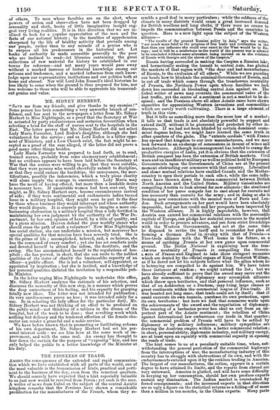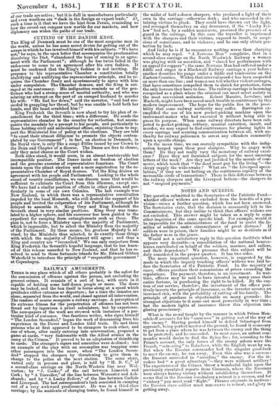THE PIONEERS OF TRADE.
AMONG the consequences of the extended and rapid communica- tion which we have established with all parts of the world, one of the most valuable is the transmission of hints, practical and perti- nent to the business of the day, even from the remotest quarters. We should scarcely have expected that a hint especially valuable to us just now would be received from Persia ; yet such is the case. ' A writer of news from Cabal on the subject of the central Asiatic kingdom remarks that the Persians have shown a remarkable predilection for the manufactures of the French, whom they se- semble a good deal in many-particulars; the coldness of-the climate in many districts would cause agreat increased demand for British wo011ens and long cloths, if there were no causes to impede the communication- between Persia and the countries in question. Here is anew light upon the subject of the Western alliance- ! "The results of the' resent Russian policy in Asia," says the writer, -" are much more fatal to the progress of free trade and civilization in the East than any influence she eotild ever exert in the West would be 'to En_ rope ; -and it will be a misfortune bathe world if the present war is allowed to be concluded without some alteration being insisted on is the relations of Russia with Georgia and the g4ores of the Veapian.."
Russia having succeeded in making the Caspian a Russian lake, -and hermetically sealing the transit to central Asia, has glutted the markets of that region with "the dear and bad manufactures of Russia, to the excluaism of all others." While we are puzzling our heads how to .blockade the eriminalGovernment of Russia, and to cut off trade which mimes through. 'the treacherous neutrality of Prussia, the Northern Power .upcin whose faculties we look down has succeeded in blockading central:Asia against us. The Cabal writer of news may overrate the commercial value of the lost traffic, yet the metre of a tiontinent is not a market to be de- spised; and the Persians above all other Asiatic races have shown capacities for appreciating Western inventions and commodities which are surely worth cultivating. There is a large elementiof truth in this view.- , But it -tells us something more than the mere loss of a market; it tells us that trade is not absolutely powerful to support and extend itself, without it be pioneered and protected by -other in- fluences. If we had not been blinded by certain dominant econo- mical dogmas before, we might Inure learned the same truth.in ,other ,quarters of -the globe. , The "entente cordiale "'with France has opened that kingdom to our iron -manufacturers, and we may look forward to an >exchange oteoneessious in favour of wines and manufactures. Although mismanagement has tended to cramp the productive energies of India, yet it is obvious that the extension of British conquest has: een the extension of British markets. Civil wars and uninsufficientmilitary :unveil:as political hold by European Governments upon the Governments of China are at the present moment obstructing,our commerce with that country. 'Liberalized and closer mutual relations have enabled Canada and the Mother- , country to open their portals to each atht r, while the same iniln- , ences have thrown dawn the fences commercial between British North America and the -United States. Military vicissitudes are , compelling Austria to look -abroad for new alliances : the straitened condition of her purse oompels her to cast shoat for recruits not less necessary than recruits for the army; and in doing so she is forming new connexions with the monied • men of Paris and Lon- ' don. Such arrangements on her part -would have been absolutely impossible, had not her credit and laer prospects been improved by the Western,alliance. It is highly improbable, however, that Austria can extend. her, commercial .relations with the mercantile capitals of Europe,can pledge her material resources to the monied world in order to procure advances, and can form strict friendships with the Western Gevernments, and not at the same time , be, disposed, to revise the tariff and to reconsider her plan of forming a German Bund in rivalry with that of Prussiaa Free-trade alliance with the West looms in the future, as a , means .of outdoing Prussia at her own game upon commercial ground. The Berlin .Yational is explaining how the tree- iherous neutrality of Prussia is compelling the Govern- , x. Cats of France and, England to take those stringent measures which-are deuied by the official organs, of King Frederick William, as if he dared- not let his subjects believe what the allies whom he is betraying are compelled to do against him. We have taken these instances at random; we might 'eoteod the list ; but we have already sufficient to prove that the sword may carve outthe path for commerce, that 'diplomacy may accomplish alliances which throw open territories, and that pereonal influence, such as that of an Ashburton or a Durham, may bring large classes or great continents within the commercial leagtu3,of Free-trade. It was boasted not long since, that trade could act by itself; that it could excavate its own tunnels, purchase its own protection, open its own territories : but here we find that commerce waits upon the achievements -of the, sword and the negotiation of diplomacy. The cunning of a barbarian power has shut us out from an im- portant part of the Asiatic continent ; the rebellion of China against international law embarrases our trade in that quarter; the commercial problem of Prussia will have to be settled *hi diplomacy or by military influences; -military sympathies are drawing the Austrian empire within a better commercial relation; in short, personal ability, diplomatic industry, and military energy, are at least upon an equality with commercial sagacity in opening the roads of trade.
The hint comes to us at a peculiarly suitable time, when, not- withstanding the general protection of the commercial highways from the interruptions of war, the manufaeturing industry of this country has to struggle with abstractions of its own, and with the embarrasments entailed upon it by the reckless trading in America. The largest of our manufactures, the cotton, appears in a certain degree to have attained its limits, and the reports from abroad are very untoward. America is glutted, and will have some difficulty in keeping up her consumption, should her own produce-exports sustain any diminution. The Indian market is overstocked by forced consignments ; • and the increased exports in that direction are as ugly a figure on the statistical returns as a falling-off of more than a million in ten months, in the China exports. Many parts of our trade are active; but it is dull in manufactures particularly and even woollens are "slack in the foreign or export trade." At, such a time is it that we have the hint from Persia, reminding us how the sword can conquer new worlds for our markets, and how diplomacy can widen the paths of our trade.

























 Previous page
Previous page